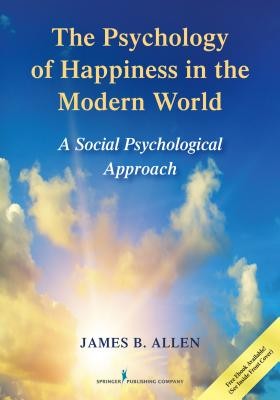
- We will send in 10–14 business days.
- Author: James B Allen
- Publisher: Springer Publishing Company
- ISBN-10: 0826132820
- ISBN-13: 9780826132826
- Format: 18 x 25.7 x 2.1 cm, softcover
- Language: English
- SAVE -10% with code: EXTRA
Reviews
Description
Written in a conversational style yet empirically grounded, this book reviews what we know about the science of happiness. It is the first text to closely examine the social psychological processes as well as individualistic approaches that affect happiness. It explores how our social, cultural, and economic environment, the personal choices we make, and our evolutionary heritage shape our happiness. Topics that are inherently interesting to students, such as how income, unemployment, marriage, children, relationships, health, work, religion, and economic growth affect happiness, are reviewed. Research from psychology, economics, and sociology is examined providing an interdisciplinary perspective of this fascinating field. Social issues such as income inequality and the effects of advertising, materialism, and competition are also explored.
Highlights include:
- Covers both the socio-structural issues and individual differences that impact our happiness, providing the most comprehensive coverage of any text available.
- Emphasizes a social psychological approach that considers factors such as income, economics, culture, work, materialism, relationships, religion, and more, often ignored in other texts.
- Relates the material to students' lives by posing questions throughout the text to further spark interest in the subject matter.
- Highlights the latest research and the methodologies used to obtain it to help students better understand how to interpret results.
- Reviews the evidence that shows that happiness can change over time and how to increase it.
- Examines how positive emotions and how we interpret events impact our well-being, along with empirically verified interventions and possible societal changes that can improve happiness.
- Features a chapter on evolutionary psychology that suggests that there are limits to happiness but how it can be enhanced by pursuing behaviors associated with the successes of our ancestors.
- Intersperses summary paragraphs throughout the chapters to facilitate learning.
- Provides discussion questions, activities, assignments, and suggested videos, websites, examples, and additional readings in the instructor's resources to stimulate critical thinking and class discussion.
- Features web-based instructor's resources including PowerPoints, sample syllabi, lecture tips and suggestions, and more.
- Intended as a text for upper-division courses in the psychology of happiness or positive psychology or as a supplement in courses in social or health psychology or psychology of adjustment.
EXTRA 10 % discount with code: EXTRA
The promotion ends in 17d.08:44:26
The discount code is valid when purchasing from 10 €. Discounts do not stack.
- Author: James B Allen
- Publisher: Springer Publishing Company
- ISBN-10: 0826132820
- ISBN-13: 9780826132826
- Format: 18 x 25.7 x 2.1 cm, softcover
- Language: English English
Written in a conversational style yet empirically grounded, this book reviews what we know about the science of happiness. It is the first text to closely examine the social psychological processes as well as individualistic approaches that affect happiness. It explores how our social, cultural, and economic environment, the personal choices we make, and our evolutionary heritage shape our happiness. Topics that are inherently interesting to students, such as how income, unemployment, marriage, children, relationships, health, work, religion, and economic growth affect happiness, are reviewed. Research from psychology, economics, and sociology is examined providing an interdisciplinary perspective of this fascinating field. Social issues such as income inequality and the effects of advertising, materialism, and competition are also explored.
Highlights include:
- Covers both the socio-structural issues and individual differences that impact our happiness, providing the most comprehensive coverage of any text available.
- Emphasizes a social psychological approach that considers factors such as income, economics, culture, work, materialism, relationships, religion, and more, often ignored in other texts.
- Relates the material to students' lives by posing questions throughout the text to further spark interest in the subject matter.
- Highlights the latest research and the methodologies used to obtain it to help students better understand how to interpret results.
- Reviews the evidence that shows that happiness can change over time and how to increase it.
- Examines how positive emotions and how we interpret events impact our well-being, along with empirically verified interventions and possible societal changes that can improve happiness.
- Features a chapter on evolutionary psychology that suggests that there are limits to happiness but how it can be enhanced by pursuing behaviors associated with the successes of our ancestors.
- Intersperses summary paragraphs throughout the chapters to facilitate learning.
- Provides discussion questions, activities, assignments, and suggested videos, websites, examples, and additional readings in the instructor's resources to stimulate critical thinking and class discussion.
- Features web-based instructor's resources including PowerPoints, sample syllabi, lecture tips and suggestions, and more.
- Intended as a text for upper-division courses in the psychology of happiness or positive psychology or as a supplement in courses in social or health psychology or psychology of adjustment.


Reviews